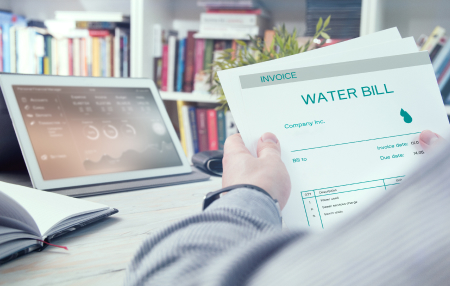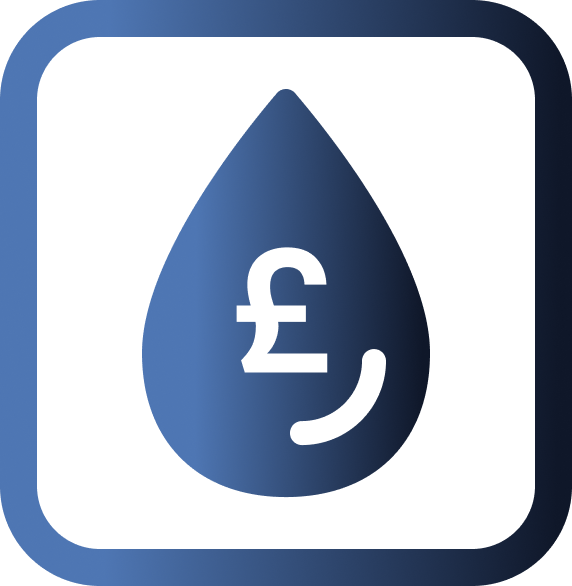

Water bill debts are any outstanding payments relating to the water supply in your home. Your water bills cover the cost of the continued supply of water to your home, allowing you access to fresh tap water, showers, baths and general plumbing. Your water supply is also used to heat your boiler and the radiators that keep your home warm during the winter months.
Payments for your water bills are typically taken monthly. Failing to keep up with these payments may result in you falling into arrears, at which point further charges may be applied to your account.
What are water bills?
Water bills are any charges or bills related to the water supply in your household. They are often charged monthly, but in some circumstances you may be charged annually or quarterly instead. Your bills are dependent on the level of water usage in your home and can fluctuate throughout the year unless you’re on a fixed tariff. Like other utilities, your water supply is closely associated with helping your home to stay habitable and comfortable.
Water bills are not considered a priority debt since suppliers cannot legally cut water supply to a home (provided this is a residence).
What happens if I’m unable to pay my water bills?
If you cannot pay your water bills, you’ll fall into arrears with your water supplier. If you fall into arrears, you’ll be expected to repay any outstanding payments and might also be charged additional late fees.
If you continue to miss water bill payments, your debts will likely be handed over to a debt collection agency who will begin to chase you more seriously for the outstanding amount. This contact can escalate from phone calls and letters to home visits and legal action. The agency may also apply additional fees on top of what you owe to your water supplier.
How could I go into debt with my water bills?
If you are unable to keep up payments towards your water bills each month, you can fall into debt with your supplier. This is more likely to happen during times of rising living costs and higher expenses. As wholesale prices rise, service providers such as water and gas companies will charge more for their services.
In the UK, water bills are capped for vulnerable households under the Watersure Scheme. In order to qualify you’ll need to receive benefits and require significant water usage as a result of medical needs or due to a specific number of school age children in your household.
Can my supply be shut off if I am unable to pay my water bills?
For domestic residences, water suppliers cannot legally cut off water supply to your home. This means that while suppliers can continue to chase you for your unpaid water bills, they cannot obstruct the continued supply of water to your home.

“It’s taken so much stress away… they’ve really given me my life back. “
— Karen, Gloucestershire
Read Karen’s story…
Can I get help for my water bill debt?
If you’re unable to repay your water bills, assistance is available. Firstly, you should ask to be added the priority services register of your water supplier. This is a service provided by suppliers that offers additional support to those who are struggling.
For many struggling with their essential costs, there are a number of benefits and government schemes that may be able to help. To see if you’re entitled to any government help or benefits, you can check on the government website.
Lastly, if you’re still having difficulties with your water bill debts, you should seek debt management advice from a professional debt advisor. With a debt advisor you can review your finances and debts and come up with a debt solution that works for you.
For free debt advice, you can visit MoneyHelper.
If you wish to speak to a MoneyPlus advisor, you can click here to learn more.
Tips for paying your water bills
Avoiding falling into debt with your water bills can be hard, especially if you’re having difficulties with other types of debt too. However there are ways to get on top of your debts.
Note that paying your priority bills, such as council tax, energy bills and mortgage payments should be at the top of your financial list, and these debts should be your main focus when budgeting.
Here are some tips for paying your water bills:
Keep a written budget: It’s easy to get overwhelmed with your bills and lose sight of your budget and spending. As times continue to be tough, it’s important that you have a clear picture of your finances. Keeping a written budget and reviewing your spending each month can help you get a clearer idea of exactly how much each of your bills amount to. This can ensure that you always know what you’ll need to spend to keep your utilities and water bills in order.
Call your supplier: At the end of the day, your water supplier wants to be paid for the services they provide. If you get in touch with your provider, they’re obligated to help you out by placing you on their priority services register. They may also off you affordable repayment arrangements to help you pay off you debts, even if it takes a little longer. There are a number of priority systems in place to protect vulnerable customers, so if you feel you need extra support, be sure to reach out.
Check your eligibility for help: If you’re struggling to pay your household bills, it’s important to see if you’re eligible for any support to ensure your utilities are covered. It’s estimated that over £13 billion in UK benefits go unclaimed. If you’re unsure whether you’re entitled to support, you can find out through benefits checks either with Turn2Us or through the GOV.UK website.
Install smart meters: Here’s a smart idea! A smart meter can give you a detailed look at all the water usage in your home, ensuring that you know exactly what you’re spending and where. By installing a smart meter, you can be more energy efficient and save on your water bill as a result.
Can I have water bill debts written off?
While you can attempt to have your water bill debts written off by contacting your supplier, it’s unlikely that this will be accepted as this measure is reserved for very extreme circumstances of unaffordability.
However, your supplier will likely offer you a more affordable repayment plan to help you repay your debts. They may also remove extra charges and late fees to help make your debts more manageable.
You may also be able to write off some of your water bills debt through a debt management plan such as an Individual Voluntary Arrangement (IVA) or through a Debt Relief Order, though this will depend on your unique circumstances and will need to be discussed with a debt advisor and your creditors.

Are you struggling with debt?
There are always solutions, no matter what your situation.
At MoneyPlus we understand that every financial situation is different, and approach every customer with the care and individuality that they deserve.
So, get in touch today and start living better with MoneyPlus Advice.
